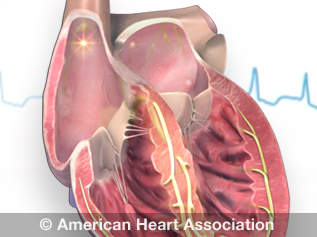High Blood Pressure, Atrial Fibrillation and Your Risk of Stroke
Quick Facts
- Stroke is a leading cause of death in the U.S.
- High blood pressure and atrial fibrillation are leading causes of stroke.
- You can take steps to reduce your risk of stroke.
Obtenga más información sobre cómo controlar la presión arterial en casa
What do blood pressure and your heart rhythm have to do with stroke risk? Plenty.
It has been estimated that about three out of four people who have a stroke have increased blood pressure at the time of stroke. And an irregular atrial heart rhythm — a condition called atrial fibrillation — accounts for an estimated 15% of all strokes in the United States.
Stroke is a leading cause of death in America. It happens when a blood vessel that supplies blood to the brain is blocked or bursts. Nearly 800,000 Americans have a stroke each year.
High blood pressure is the chief culprit. Atrial fibrillation, also called AFib or AF, isn’t far behind. Yet there’s good news: You can easily do something about both. Your best defense is to avoid or manage these conditions through a heart-healthy lifestyle. But even if you’re living with AFib or high blood pressure, there’s still a lot you can do to help lower your risk of stroke.
The stroke connection
The brain needs blood and oxygen. When this crucial nourishment can’t reach the brain — because of a clogged artery or a burst vessel — brain cells start to die.
For people with high blood pressure, the force of blood pushing against the arteries as the heart pumps blood is too high. That causes gradual damage to the arteries, including those to the brain. A weakened blood vessel may rupture in or near the brain, or diseased arteries may become blocked by a clot or plaque buildup.
Then there’s AFib. That’s when stroke risk increases because a rapid heartbeat allows blood to pool in the heart. This can cause clots to form and travel to the brain.
High blood pressure is a risk factor for AFib. If you don’t control your high blood pressure as you age, you may also get AFib. That would increase your risk of stroke even more.
How to reduce stroke risk
Stroke may be prevented even if you have high blood pressure or AFib. Preventing or controlling these conditions can greatly lower your chances of having a stroke. Here’s how:
- Don’t smoke.
- Get regular physical activity.
- Maintain a healthy weight.
- Limit alcohol to no more than two drinks a day for men or one drink a day for women.
- Eat a healthy diet that:
- Is high in fruits, vegetables, and whole grains
- Includes low-fat dairy products
- Limits salt, saturated fats, trans fats and cholesterol
- Monitor your blood pressure and work to keep it at your goal.
- Take your medications as prescribed if you have high blood pressure or AFib.









